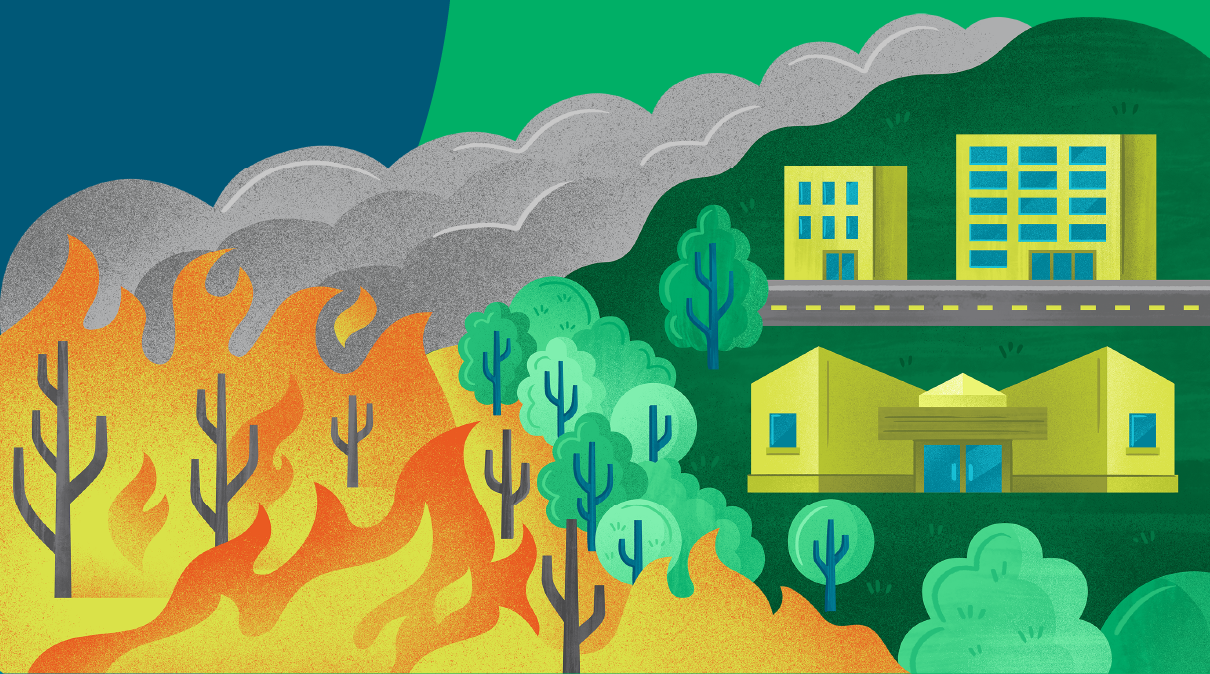Global climate change has local impacts. Municipalities bear the brunt of extreme weather events such as drought, wildfires, and flooding. In response to these events, municipalities must become climate resilient by understanding, planning, and acting on the current and future impacts of climate change.
Climate adaptation refers to anticipating the impacts of climate change and taking appropriate action to prevent or minimize the damage that may be caused, or to utilize the opportunities that may arise because of climate change. Examples of local government action on climate adaptation include planning and developing policy tools, land-use planning and zoning to build climate-safe infrastructure and creating increasingly effective emergency response plans for extreme weather conditions.
Interested in fostering climate adaptation measures in your municipality? The Climate Adaptation Challenge will offer two Alberta communities free assistance in developing adaptation plans for communities. The Climate Adaptation Challenge is inviting for Expressions of Interests until October 28, 2021.
Tip: Register for an upcoming webinar scheduled for October 21 to learn more about the program.
“The Climate Adaptation Challenge is a great place to start for small municipalities with little to no experience in climate risk assessment and adaptation planning.”
Trina Innes, Executive Director, Municipal Climate Change Action Centre
Climate adaptation planning for municipalities
Delivered in a partnership between the Municipal Climate Change Action Centre and All One Sky Foundation, the Climate Adaptation Challenge offers free support to help municipalities understand how climate change is impacting their community and create plans to address the forecasted changes. Two municipalities will be selected to receive capacity building services that produce a climate risk assessment and adaptation plan.
Why does your community need a climate adaptation plan?
The climate is already changing. Over the past 100 years, Alberta’s climate has warmed by 1.5 degrees Celsius. Over the next 100 years, Alberta is projected to warm by another 4 degrees Celsius.
Changes in climate increase the frequency and intensity of extreme weather events, from drought and forest fires to floods, these events are significantly impacting Alberta communities.
Municipal infrastructure assets are sensitive to the gradual changes in temperature and precipitation as well as in risk of being overwhelmed from extreme weather events. The Insurance Bureau of Canada reported that two most costly disasters in Canada’s history are the 2016 Fort McMurray wildfires ($3.58 billion) and the 2013 southern Alberta floods at $1.7 billion.
While climate change can cause infrastructure to be damaged, it also has a substantial impact on people, drastically changing their quality of life or displacing entire families. A severe hailstorm struck Calgary in 2020, causing an estimated $1.5 billion in damages, mainly to residential homes. Families in Calgary were still dealing with repairs, a year later.
Planning for the impacts of climate change will help your community be more prepared for extreme weather events and other climate change impacts, save money and minimize negative effects.
What will be the outcomes of the climate adaptation plan?
The Climate Adaptation Challenge will use an established Climate Resilience Express toolkit to help your community. Participating communities’ climate adaptation plans are expected to include:
- Summary of relevant community plans, policies, and bylaws
- Summary of historic experience with climate impacts and extreme weather
- Summary of local climate change projections
- Climate impact statements with definitions and thresholds
- Climate change risk assessment results
- Summary of action planning research
- Summary of public engagement outcomes
- Summary of the climate adaptation plan
Tip: Learn more about the 14 Alberta municipalities that previously received support from All One Sky Foundation in the development of climate adaptation plans using the Climate Resilience Express approach.
How to apply
Start by reviewing the Guidebook to get to know the program.
Submit an Expression of Interest by October 28, 2021. For assistance with the form, please contact the Action Centre.
We will review each application and select two municipalities to participate in the program. Your application should fully explain why your municipality needs climate adaptation support, and how your municipality would benefit from this program.


You must be logged in to post a comment.